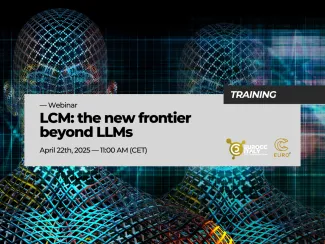
Artificial Intelligence is undergoing a major evolution, with new architectures emerging that promise to overcome the limitations of current language models. Following the success of Large Language Models (LLMs)—widely used in numerous Natural Language Processing (NLP) applications—a new technology is set to revolutionize the field: Large Concept Models (LCMs).
Developed by Meta, these models introduce a paradigm shift in language processing, adopting a concept-driven approach rather than relying on token-based text processing. Thanks to this innovation, LCMs aim to enhance contextual coherence, reduce errors typical of token-based models, and enable a deeper understanding of abstract meanings.
To explore this groundbreaking architecture, EuroCC Italy is hosting the webinar “LCM, the end of LLMs”, an event designed for industry professionals, researchers, and AI enthusiasts who want to understand the potential of this new technology.
Webinar: LCM, the end of LLMs
📅 Date: April 22, 2025, at 11:00 AM (CET)
📍 Where: Online
🗣️ Language: English
🎙️ Speaker: Domitilla Brandoni, HPC Data Engineer at Cineca
What are LCMs?
In recent years, AI has made remarkable progress thanks to Large Language Models (LLMs), which have demonstrated unprecedented levels of coherence and fluency in text generation. However, these models rely on a specific unit of text processing: the token, which represents a word, a part of a word, or a symbol in a given text. While effective, this approach comes with certain limitations:
- Fragmented language understanding: LLMs process text as a sequence of tokens, often lacking a true comprehension of underlying concepts.
- Context management challenges: Attention window length and dependence on prior context can compromise response quality.
- Risk of generating incoherent text: Probability-based generation can lead to repetitive or inaccurate responses.
Large Concept Models (LCMs) overcome these limitations by introducing a conceptual approach to language processing. Using a concept encoder, LCMs operate within an abstract semantic space, structuring and linking information based on deeper meanings rather than simple text units. This enables:
✔ Improved contextual coherence in AI-generated responses.
✔ Less reliance on traditional tokenization constraints.
✔ More precise comprehension of the fundamental concepts behind a given text.
This new AI paradigm paves the way for more advanced, adaptable, and high-performing models, with applications spanning various fields, from scientific research to enterprise knowledge management and automated decision-making.
Webinar Agenda
✔ The innovations introduced by LCM architectures
✔ LCM architecture overview
✔ How to train an LCM
✔ Main types of LCMs
This webinar is a unique opportunity to dive deeper into LCMs, evaluate their advantages over traditional language models, and explore their potential applications in both industry and academia.
Registration
🔗 Sign up now: Fill out the registration form at the dedicated link.